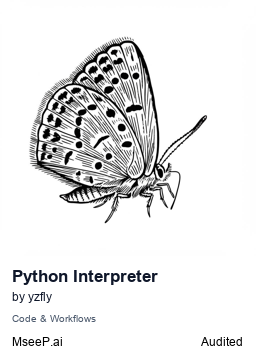Capabilities

Overview
The MCP Python Interpreter is a Model Context Protocol server that bridges large language models with real‑world Python environments. It solves the problem of safely executing code, managing dependencies, and manipulating files from within an AI assistant, all while keeping the execution sandboxed to a user‑specified directory. This eliminates the need for developers to manually set up isolated environments or write boilerplate scripts, allowing AI assistants to act as full‑blown Python development partners.
At its core, the server exposes a rich set of tools that let an LLM run arbitrary Python code or scripts, list and switch between system and conda environments, install packages on demand, and read or write any file type. By confining all operations to a dedicated working directory, the server enforces strict security boundaries: code cannot escape to the host file system unless explicitly allowed. This makes it ideal for scenarios where an AI assistant needs to prototype, debug, or iterate on code in a controlled setting—such as educational tools, rapid prototyping, or continuous integration pipelines.
Key capabilities include:
- Environment Management – discover available Python interpreters, switch contexts, and install packages on the fly.
- Code Execution – run snippets or entire files in any selected environment, capturing stdout, stderr, and exit codes for transparent feedback.
- File Operations – read text, source code, or binary files with size limits; write new files or overwrite existing ones; list directory contents for quick navigation.
- Prompt Templates – pre‑defined prompts for common Python tasks (function scaffolding, refactoring, error debugging) that the LLM can invoke to produce structured code snippets.
Typical use cases are diverse: a developer can ask the AI assistant to “install pandas, load data from , and plot a histogram” and see the result instantly; an educator can have students write code that the AI evaluates and provides feedback on; a CI system can trigger automated tests by having the assistant execute test scripts in isolated environments. In each scenario, the MCP server acts as a secure execution engine that the AI can control through declarative tool calls.
Integrating this server into an AI workflow is straightforward. Once registered in the client (e.g., Claude Desktop), the assistant gains a dedicated tools icon and can invoke any of the exposed methods via natural language prompts. The server’s resources (e.g., ) provide quick lookup data, while the prompts streamline common development patterns. Because all operations are defined by MCP, any client that understands the protocol can leverage these capabilities without custom code.
Unique advantages of the MCP Python Interpreter include its tight security model, environment‑agnostic execution (supporting both system and conda Python installs), and a comprehensive set of file handling utilities that go beyond simple text. By turning an LLM into a real Python IDE through MCP, developers can accelerate experimentation, reduce boilerplate, and maintain reproducible, isolated development workflows.
Related Servers
MarkItDown MCP Server
Convert documents to Markdown for LLMs quickly and accurately
Context7 MCP
Real‑time, version‑specific code docs for LLMs
Playwright MCP
Browser automation via structured accessibility trees
BlenderMCP
Claude AI meets Blender for instant 3D creation
Pydantic AI
Build GenAI agents with Pydantic validation and observability
Chrome DevTools MCP
AI-powered Chrome automation and debugging
Weekly Views
Server Health
Information
Explore More Servers
Agenda MCP Server
AI‑powered note & project management for macOS Agenda
SDKMAN Interactive MCP Server
Chat‑based SDK management for developers
Mcp Dbs
Unified MCP server for SQL and NoSQL databases
Sourcerer MCP
Semantic code search for AI agents
MCP Atlassian Server
Connect AI agents to Jira and Confluence with a unified interface
Dokploy MCP Server
Expose Dokploy APIs via Model Context Protocol